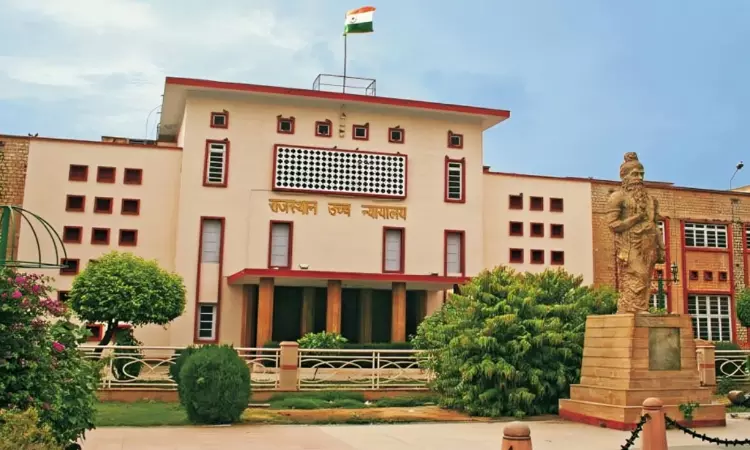- Home
- /
- High Courts
- /
- Rajasthan High Court
- /
- State Denying Salary To Employee In...
State Denying Salary To Employee In Coma Since 2023 Is Inhuman, Violates Article 21: Rajasthan High Court Directs Review Of Dues
Nupur Agrawal
7 Oct 2025 12:00 PM IST
Rajasthan High Court expressed its pain with the State government for not paying salary to a government employee in coma for over two years after suffering brain hemorrhage, calling it inhumane, unreasonable and violative of Article 21 of the Constitution of India.Considering the “inhumane and arbitrary approach” and fairly settled law around the situation, Justice Ravi Chirania, instead...
Rajasthan High Court expressed its pain with the State government for not paying salary to a government employee in coma for over two years after suffering brain hemorrhage, calling it inhumane, unreasonable and violative of Article 21 of the Constitution of India.
Considering the “inhumane and arbitrary approach” and fairly settled law around the situation, Justice Ravi Chirania, instead of awaiting reply from the State, directed it to examine the employee's case regarding his dues and medical bills within 7 days. The court said:
“The financial condition of a government servant who has not been paid salary from the last more than one year and is in coma from the last two years can easily be imagined by the respondents…A sudden medical problem has declared the employee as a deadwood for the respondent- State Department and they are least bothered about his condition...This Court is in pain noticing the inhumane and arbitrary approach and act of the respondents. Though in the usual circumstances, as already mentioned above, the respondents would have been permitted to file the usual reply however, they would have taken further time in resolving the grievance of the petitioner which, as already mentioned above, hardly require any adjudication by this Court in terms of the law as laid down”.
It further emphasized that "every person has a right to live a healthy and dignified life" and the act of respondents in not making the payment of salary from August, 2024 and further not reimbursing the medical bills is in "serious violation of Article 21 of the Constitution of India".
The court said that after examining the employee's case if the respondents do not find any genuine legal hurdle then they would make the payment of complete due amount against the salary and would reimburse all pending medical bills.
"The respondents are further directed to ensure that all future medical bills are also duly taken care of and paid at the earliest on submission without putting any administrative hurdles and obstacles," the court added.
The Court was hearing the petition filed by the wife of a Commercial Taxes Officer, who was in a coma since 2023, and the State was not paying his salary or reimbursing his medical bills without any justified reasons.
It was submitted on behalf of the petitioner that the husband of the petitioner was suffering from 76% disability, and was also issued a unique disability card by the government. Hence, the act of the State was in violation of Section 20(4) of the Persons with Disabilities Act 2016, as well as Article 21 of the Constitution of India.
The Finance Secretary, Revenue was present before the Court through VC, and submitted that he was not aware of the complete facts of the case, ensuring to look into the matter and resolving it at the earliest.
After hearing the contentions, the Court highlighted Section 20(4) of the Act which mandated that no government establishment could dispense with or reduce the rank of any employee who acquired a disability during his/her service. Reference was also made to certain precedents of the Apex Court and the coordinate bench of this Court.
It was held that the law was settled to the effect that the employer could not run away from its responsibilities and duties to pay the salary and other benefits to an employee who had suffered disability for various reasons under the Act.
In this background, the Court also observed that,
“…the cost of medical treatment in the case of a person who is in coma and continuously in bed and under treatment in the hospital, is very high and unbearable for a government servant who has not been paid salary for more than a year. Not making the payment of the due salary and not reimbursing the medical expenses is inhumane, arbitrary, unjustified and unreasonable on the part of the respondent-State Department specifically in the facts and circumstances of the present case.”
The Court held that this sudden medical problem had declared the employee a "deadwood" for the respondent, who otherwise worked for them with utmost dedication, honesty and integrity.
Accordingly, the State was directed to examine the case of the employee regarding his due salary and medical bills within 7 days, and reimburse the same without further delay unless the State found some real and genuine legal hurdle.
The Court also expressed expectation from the Finance Secretary, Revenue, to take reasonable steps for compliance with the above-mentioned directions.
Hence, the petition was disposed of.
Title: Megha Kanwar v State of Rajasthan & Ors.
Citation: 2025 LiveLaw (Raj) 339



